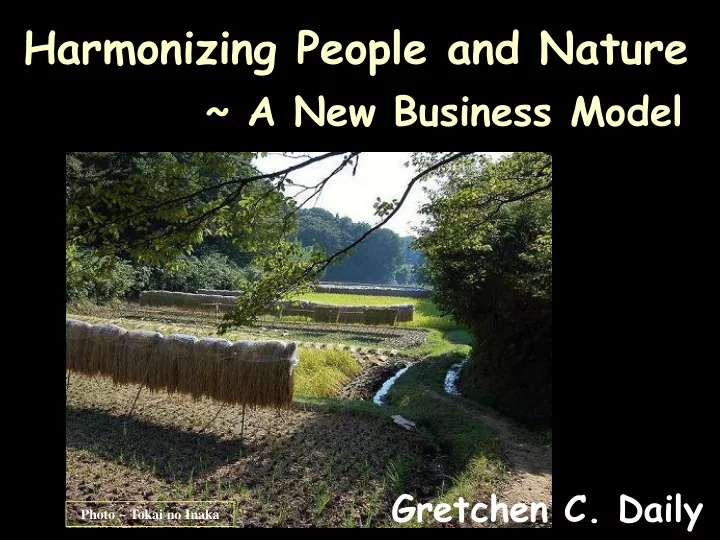

Harmonizing People and Nature ~ A New Business Model Gretchen C. Daily Photo ~ Tokai no Inaka
1. Provisioning Services Seafood Crops & Livestock Forest Products
2. Regulating Services Climate Stabilization Water Supply Fire Prevention Flood Control Sedimentation Control Pest Control Pollination
3. Cultural Services Spiritual Values Inspiration Aesthetic Values Knowledge Systems Educational Values Sense of Place Recreation Ecotourism
4. Supporting Services & Preservation of Options Biodiversity Resilience Primary Production
Decisions Institutions Ecosystems Services Value
Decisions Actions & Incentives Scenarios Ecosystems Institutions Biophysical Information Models Services Value Economic & Cultural Models
Three Stories 1. Beyond Reserves 2. Beyond Biodiversity 3. Beyond Charity
First Story: Beyond Reserves Decisions Ecosystems Institutions Services Value
Biodiversity in Countryside Biodiversity Land Use Intensity
Biodiversity in Countryside Biodiversity Land Use Intensity
Biodiversity in Costa Rican Countryside
Short-term Outlook: Good Biodiversity Land Use Intensity
Long-term Outlook? Malabar Coast Work led by Dr. Jai Ranganathan
Cashew Shrub
Production Forest Forest Cashew Shrub
Production Forest Forest Arecanut Arecanut Cashew Shrub
All Birds Forest Birds Species Richness Species Richness Great Hornbill Photo: D. Behrens Malabar Grey Hornbill Photo: M.S. Ashok
Countries with Significant Arecanut Cultivation
What is the long-term trend for biodiversity in countryside? High potential conservation value in widespread production systems
What is the long-term trend for biodiversity in countryside? Critical window of opportunity
Three Stories 1. Beyond Reserves 2. Beyond Biodiversity 3. Beyond Charity
Second Story: Beyond Biodiversity Decisions Ecosystems Institutions Services Value
The value of biodiversity?
Pollination Services - to natural populations • 60-70% of flowering plant species require it • Plant populations often limited reproductively by lack of pollinators (45% of natural populations studied; Burd 1994).
Pollination Services - to crops • 15-30% of food production depends on animal pollinators • Of 1300 crops worldwide, 70% require animal pollinators for one or more cultivars (Roubik 1995)
Crop pollination • Honeybee declines worldwide • Can wild bees to do the job? • Value of their habitats? tomato apple coffee
Coffee for Conservation? Do forest pollinators benefit nearby coffee? Can we measure the benefits to farmers?
Pollination vs Distance from Forest Cumulative richness (Ricketts 2004 Cons Biol) (indiv/sample) Abundance Pollen grains / stigma Visits/100fl/20min Near Medium Far Near Medium Far 0.1 km 0.7 km 1.6 km 0.1 km 0.7 km 1.6 km Distance Distance
Value of rainforest to farmers? $ Coffee near forest: $ • more diverse bees • more pollination • 20% higher yields Value of forest: $60,000/year to 1 farm (Ricketts et al. 2004 PNAS )
? ? ? ? ? The value of biodiversity? ? Valuing ecosystem services
Valuing Ecosystem Services Global Synthetic
Valuing Ecosystem Services $ $ Value of rainforest: Local US$ 60,000/year Specific to 1 farm (Ricketts et al. 2004 PNAS )
Valuing Ecosystem Services Global $ Synthetic $ Value of rainforest: Local US$ 60,000/year Specific to 1 farm (Ricketts et al. 2004 PNAS )
The Natural Capital Project 1. Science → new tools 2. Demonstration in sites globally 3. Magnifying the impact
InVEST Integrated Valuation of Ecosystem Services & Tradeoffs
Scenario Tool How will ecosystem service values change… With climate change? With population growth? With a new policy or program?
How would restoration affect agricultural income drinking water quality erosion control carbon sequestration & biodiversity?
InVEST 1.0 can map & value Biodiversity Water pollution regulation Carbon sequestration & storage Managed timber production Crop pollination Avoided reservoir sedimentation
And also… Tourism & recreation Agricultural production Flood mitigation Hydropower production Irrigation Open access products
Marine InVEST Fisheries, Aquaculture Coastal Protection Recreation & Tourism Wave Energy Siting
Data inputs on natural capital Land Use Soil type Topography
Data inputs on built capital Roads Cities Infrastructure
Outputs of ecosystem service levels supplied and demanded
Download InVEST at http://invest.ecoinformatics.org Kareiva, Ricketts, Daily, Tallis, & Polasky, Eds. 2010. The Theory & Practice of Ecosystem Service Valuation in Conservation . OUP.
Three Stories 1. Beyond Reserves 2. Beyond Biodiversity 3. Beyond Charity
Last Story: Beyond Charity Decisions Ecosystems Institutions Services Value
The Natural Capital Project West Coast Hawai’i Belize China Uganda Colombia Mexico Ecuador Amazon Tanzania Indonesia Basin
Land Use Decisions in China China 1.InVEST Development 2.InVEST in Master Planning 3.Policy Evaluation
China Upper Yangtze River Basin Baoxing County Hainan Island
Baoxing County chinese monal Giant panda Red panda
Baoxing EFCA Mapping with InVEST Draft PRODUCTION: DEMAND: EFCA Hydropower - Water Retention Map Flood Mitigation - Soil Retention Irrigation - Carbon Storage Agriculture, Mining - Biodiversity
Upper Yangtze EFCA Mapping with InVEST Water Retention Soil Retention Carbon Storage Bio- diversity
Policy Evaluation Program success? For people & nature
Water Funds in L. America Replicate & scale water Colombia funds Ecuador 1. New finance & policy mechanisms 2. Targeting of activities
Water Funds $$
Resource Licensing 1.Target resource use & conservation Colombia 2.New offset & mitigation policies
Colombia mining agriculture transportation and other major sectors.
Looking ahead… Food Security & Health Poverty Alleviation Engaging Leaders
Thank you
Recommend
More recommend